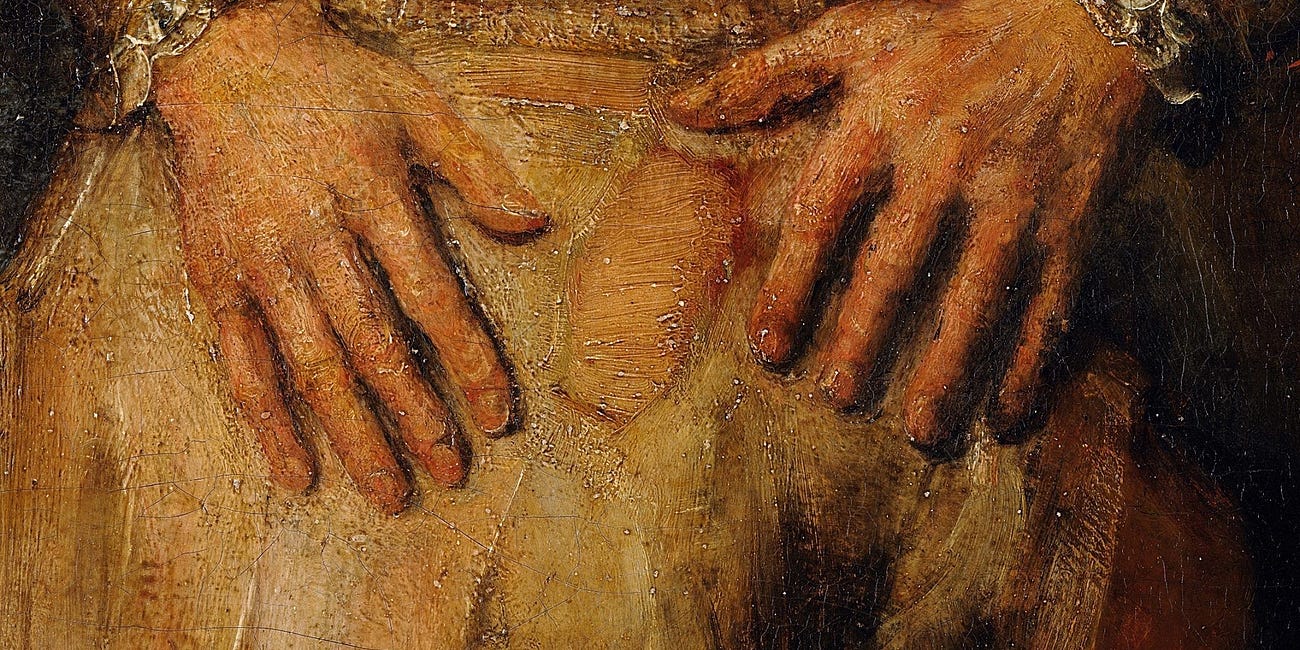A homily for the 26th Sunday in Ordinary Time (C). At the very moment I was delivering this homily in New Jersey, there was yet another church shooting, in Michigan. Lord, have mercy.
Quia misericordiam volui.
(I desire mercy.)
Hosea 6:6

Sometimes I wonder where it all went wrong.
I don’t mean our individual lives, which have their good times and bad. I’m talking about the world, about our country. We seem broken.
Of course, it all went wrong at the beginning, when our first parents chose Satan’s lie over God’s truth. I don’t blame them. I probably would have done the same thing. You know how I know that? Because I still do. I still sin. I still choose my ways over God’s ways. And if it’s not God’s truth, God’s way–then it’s just the devil’s lie.
But in the time since my last homily, we have experienced one act of violence after another, including a public assassination.
And while the horrible images of Charlie Kirk were troubling enough, then we saw the reactions. People actually celebrating it.
Then there were those who said, “It was wrong, however…”
No. There is no “however.” Look, I’m not a political person. I’m not on any “side” except the side of Christ and his Church. But I know this much: we can’t justify violence.
There is no “however” with that.
What I witnessed was a widespread failure of mercy. We see it so much now, and it’s not limited to one side or the other. God demands mercy from everyone and for everyone: the widow, the orphan, the alien, the poor, the sick, the prisoner, even the enemy. Yes, even those people we find it hardest to show mercy to. Especially them.
It’s not supposed to be easy. If it was easy, he wouldn’t have to keep telling us to do it.
Mercy is at the very heart of our faith. I desire mercy not sacrifice, says the Lord. And as our country loses Christ, it loses that.
And mercy is what today’s readings are all about.
We hear from the prophet Amos, a very unusual man. He wasn’t an ordinary prophet. He was a “herdsman and a dresser of sycamore trees,” not a priest or an elite. Just a working guy.
The ruling class of his day was very wealthy and indifferent to the people below them. They reclined on elegant furniture while they took the best of the crops and livestock from the poor. They didn’t care about the ruin coming upon them. All they cared about was their own comfort and pleasure. And so God warned that they would be the first sent into exile, because they failed to show mercy.
Those same people are represented by the rich man in the parable we just heard. The rich man ignored Lazarus and his suffering. Lazarus had nothing but his misery. The rich man had everything, except mercy.
In death, it’s reversed, and the rich man suffers in hell, while Lazarus is in the Bosom of Abraham. Paradise.
And from his misery, the rich man calls out for mercy. He wants his five brothers to be warned so they don’t end up in hell, so we can assume they’re doing the same thing he was doing. But Abraham says they were already given a sign. Moses. The prophets. The Bible.
No no! the rich man says. Send them a sign that proves those other signs. Send someone back from the dead to tell them.
Well. Jesus is telling this story, and he already knows that coming back from the dead will not be enough to melt merciless hearts. Jesus rose from the dead, and yet here we are in a nation that seems to have more prosperity each year, but less mercy.
I’ve talked to people like the rich man. They want proof. They want a sign, but the world is already full of signs. Ask any one of us in ministry about some of the things we’ve seen at deathbeds, in hospitals, in prisons, in psychiatric wards. In our own hearts.
Jesus lives. I am telling you it’s true. Now am I an idiot or a crank or a fool? Okay, maybe. But if so, I’m in good company. Many of the finest minds who ever walked the Earth, many of the greatest saints of history, billions of ordinary people, have all believed what we profess here. Many offered their lives for it.
So the good news is–it’s all true.
The bad news is–that means we have to live differently. We need a generosity of spirit that allows us to see Christ in the beggar in the street, the immigrant, the prisoner, the political opponent. A radical mercy that demands we live not merely for Christ, but as Christ in the world.
When people look at us, do they see Christ?
In my case, not always. I fail a lot. I guess we all do. But hopefully we recognize those failures of mercy, and then we try again.
I don’t know about you, but things changed for me this month. I don’t follow current events very closely, and although I knew our nation was spiritually sick, I didn’t realize it was this far gone.
And yet I know that our nation is full of good people, generous people, but most importantly people without hate in their hearts. People abounding in love and mercy. People who crave something different.
I’ve heard that many are returning to church. That a revival is going on. Over a hundred million people tuned in for a Christian memorial service. Good. Great. Tell your loved ones to get back to mass. We’d love to welcome them home.
But if there is to be a revival of faith, of Christ, of mercy, it begins in each and every human heart. So let it begin in each of ours.
Mercy in a Merciless Time
If there is one terrible disease of our time–particularly among the young–it is despair. Not everyone suffers it, but everyone is touched by it, and it is caused in large part by this unforgiving and cold technocracy we’ve allowed to choke out light and life like weeds in overgrown garden.





Well said.